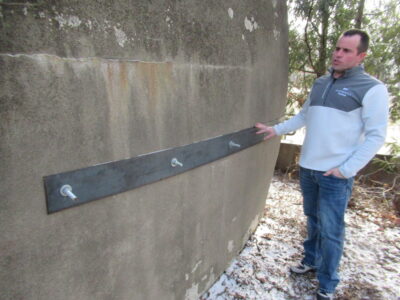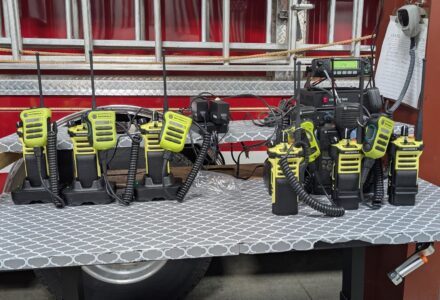I believe in, and love this job’
Brunsvold assists soldiers and their families deal with deployments

Photo by Jim Tate Soldier and Family Readiness Specialist Carmen Brunsvold is shown with a painting of her family, which was painted by an Iraqi artist from a wallet-sized photo that her husband, Doug, gave to him during his deployment in Baghdad in 2004-05.
MARSHALL — Carmen Brunsvold sat at the dining room table in her Marshall home and took a break from answering emails and text messages from the families of deployed soldiers who had questions.
She had personal and work cell phones nearby that continually “dinged” and occasionally glanced at her laptop screen, keeping an eye on incoming emails. She was the epitome of a multitasker. “Normally, I’m in my office in Montevideo, but they’ve started their two weeks of training so I’m working from home for a while,” she said. “I’ve had situations where both phones were ringing, and the (office land line).”
Brunsvold has been through many deployments in her own family, and flatly states, “Deployment sucks.”
Brunsveld is a Soldier and Family Readiness Specialist in this part of the state. It’ a federal position with the Department of Defense “and is a concept that started in 2008,” she explained. The position was formerly called a Family Readiness Support Assistant, but that title and her job responsibilities changed in 2020 to include broader responsibilities.
Her Guard communities include Pipestone, Montevideo, Appleton, Madison, Marshall, and Ortonville, plus military police groups in Monticello and Stillwater. “There’s times I’m on the road a lot,” she said.
She has been especially busy lately, as 70 soldiers from the National Guard Alpha Battery, 1st Battalion,151 Field Artillery Regiment were deployed at the end of May. They are from 65 communities in Minnesota, the Dakotas, Wisconsin and Michigan, and will serve in the Middle East, “probably Kuwait,” she said.
During deployment, Brunsvold will do monthly outreach to the primary contact of each deployed soldier. “It’s a Department of Defense mandate,” she explained. “I’ll email, text or call. I just check in and see how things are going for them, and see if they have any questions or needs. It gives the soldiers peace of mind and allows them to concentrate on their mission, and not have to worry about family issues.”
Brunsvold’s work is invaluable, and is often behind-the-scenes. She is a liaison for both the families of deployed soldiers, and the soldiers themselves. Got a question? She’s your first contact.
“With deployments, there’s young wives with little kids. They may need someone to mow the yard, shovel the walks. It’s my job to help find that assistance — to help out where I can, in a variety of ways. I also support veterans, and their families, where I can.”
She, in turn, relies on the local Beyond the Yellow Ribbon group in town. Marshall has been designated a Beyond the Yellow Ribbon Community, and SMSU is designated a Yellow Ribbon Company, which means there’s a core of volunteers to help soldiers, their families and veterans in any number of ways. “There’s assistance available from law enforcement, ministerial group, school, mental health, just about any area you can think of,” she said. “If there’s a need, I’ll reach out, and hopefully fine someone who will step up.”
A couple of months prior to deployment, the state organizes a Family Preparation Academy, a one-day event where family members and soldiers can come and take classes and learn about all that’s available in terms of support services. “Educational benefits, insurance, how to stay connected, all sort of topics,” she said. There’s also a Provider Alley as part of the day. “It’s an informational fair,” said Brunsvold.
Alpha Battery will be gone for a year. And just as there was information available prior to deployment, there’s also a program for families to help when they return. “It’s a reintegration program and it is held about halfway through their deployment,” said Brunsvold. “It’s hard being separated, and there will be a ‘new normal’ once they return. The husband-wife relationship will be different, as will relationships with their kids.”
She is keenly aware of what families go through when a soldier is deployed. Her husband, Doug, was deployed 2004-05, and 2009-10. Her youngest son, Ryan, is part of the Alpha Battery group and is being deployed for the second time. Her oldest son, Quentin, was deployed once, and second son, Eric, was deployed three times. A daughter, Rebecca Ortmann, is married to a Navy veteran and assists with families’ needs as an Advisor for the Soldier and Family Readiness Group.
“One thing that people don’t realize is that there’s a lot of people struggling with things — finances, mental health, all sorts of things — and everyone has their own struggles. Marshall and other communities in southwest Minnesota are very supportive of their military members.”
Brunsvold said that mental health has been a military emphasis for years now, and pointed to a Mental Health Coalition Conference that will be held in Marshall in October.
“The military is a proud group and they don’t like to reach out for help,” said Brunsvold. “The toughest part for them is taking that first step, asking for help. Sometimes that happens because of a crisis in their lives.
“I believe in, and love this job,” she said. “My biggest reward is when I have a family member, or a soldier, come up and thank me for what we do. I like knowing I have helped a family with whatever situation they may encounter. I’ve been through a lot of deployments and you have empathy for these young families, who wonder how they are going to make it. I help make sure they do.”


